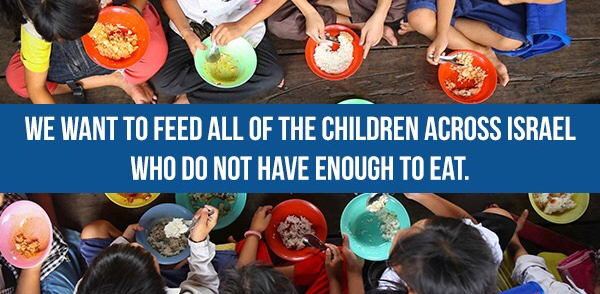With nearly 31 percent of the approximately 131,000 “single parent” families in Israel living in poverty and two out of every five children going to bed hungry, the need to ensure the success of Israel’s future is pressing today. Providing Israel’s struggling families with proper daily nutrition is a challenge that the global community needs to take notice.
By: Tsivya Fox
Ruth’s father died two years ago of cancer. Since then, her mother, Yaffa has been struggling to raise Ruth and her brother on the meager salary she earns from ironing shirts at a local laundromat. Without charitable support, the family would have almost nothing to eat.
One organization that helps Yaffa maintain her family is Meir Panim, which provides the family with hot meals through its restaurant-style soup kitchens and prepaid shopping cards before Jewish holidays.
“They help us a lot,” Yaffa told United With Israel.

The story of Ruth’s family is not an isolated one. According to Israel’s Central Bureau of Statistics, there are approximately 131,000 “single parent” families in the country, nearly 31 percent of which live in poverty. In addition, two out of every five children in Israel go to bed hungry. Lack of proper nutrition, especially with young children, stunts growth, causes lack of concentration in school and leads to illness.
Charities that provide food and other social welfare services are crucial to the survival of hundreds of thousands of struggling Israelis. Meir Panim alone delivers 190,000 Meal-on-Wheels each year to impoverished and homebound elderly people and single-parents. Additionally, children across the country receive 21,000 prepaid shopping cards and 100,000 hot school lunches from Meir Panim. However, the organization is finding it challenging to keep up with demand.
“It costs around $4.80 per meal to feed one hungry child,” said Goldie Sternbuch, director of overseas relations for Meir Panim. “Normalizing the lives of Israel’s poverty-stricken citizens is our top priority.”
Israel’s National Insurance Institute reports that over 80 percent of single mothers work. However, due to expensive child care and problematic laws, which stunt women from making more than the minimum wage or they lose their child support, one-fourth of single mothers and their children live in poverty.
For example, a woman with one child who earns a maximum of 5,489 shekels a month ($1,570), is not entitled to state assistance. Should she have two children, she cannot exceed 6,282 shekels a month ($1,790) in income.
Although single mothers are entitled to state-funded professional training, they must pay tuition themselves. Even though they may get reimbursed, there is a layover time, which most of these struggling women cannot afford.
Also, public housing is only available for single mothers with at least three children. Since rental costs are high in Israel, single-parent families are forced to live in the periphery where the rent is cheaper but also where work is scarce. As a result, the vicious cycle of poverty continues. Such factors force single-parent families into the position of accepting help from non-governmental organizations.

“The prepaid shopping cards that Meir Panim provides go a long way to help struggling families feel like regular families and maintain their dignity and independence,” explained Sternbuch.
“People shop in regular supermarkets, picking out food and supplies their family needs and allowing their living situation to feel like a home, with bags of food coming into the door and meals cooking in pots.”
In order to ensure that the thousands of people who seek help from Meir Panim get the basics that they need to survive, the organization is running an urgent crowdfunding campaign. For just $1 a day over the course of a year, a donor can get the satisfaction of knowing that they have fed a child like Ruth.
“The hardest thing is when my children come home from school and ask, ‘what is there to eat?’ And I have to say, ‘Nothing,’” said Yaffa quietly. “It is hard to say, but I need people to help us so we can get the food we need to survive.”
Some of Israel’s hungry children attend after-school clubs that provide hot meals, which gives children at least one hot, balanced meal a day.
“Malnourishment is a plague we need to remedy,” said Sternbuch. “Children are Israel’s future. We must get off the OECD’s list of countries with a high rate of poverty. We must help today in order to ensure that Israel continues to be a thriving country. ”
To help feed a hungry Israeli child for a year, please click here.











